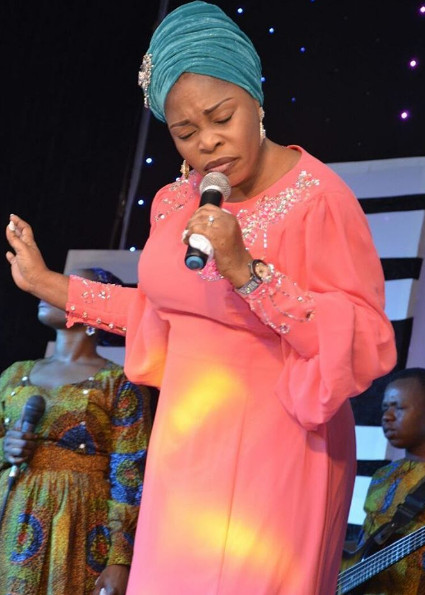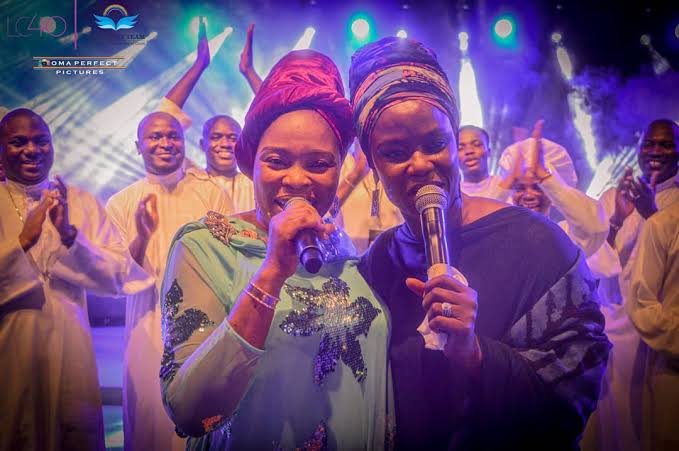The are moments when sound seems to linger in the air long after it has been sung, when a melody traces invisible paths through memory, hope, and despair, and when a voice does not merely speak—it excavates the soul. In the realm of Nigerian gospel music, few have mastered this alchemy as profoundly as Tope Alabi and Sola Allyson.
- Biographies: Lives Woven in Faith and Song
- Their Voices: Instruments of Tension and Release
- Contrasting Styles, Complementary Spirits: The Gospel Landscape They Shape
- Cultural and Spiritual Anchoring
- Interplay Between Voice and Instrumentation
- Psychological Resonance: Why We Feel Called to Surrender
- Ritualized Listening and Personal Reflection
- The Eternal Echo of Tension and Release
- EndNote: The Lasting Imprint of Their Music
Their songs are not simply compositions; they are journeys, a delicate tension of anticipation and release, a push and pull between the human heart and something larger, ineffable.
Listeners often describe an almost physical sensation when their music begins—the throat tightens, the chest rises and falls with an unseen rhythm, tears come unbidden, or a sudden, quiet strength anchors the spirit. It is as if each note is a carefully placed heartbeat, each pause a moment suspended in time, compelling the soul to lean forward, to wait, to surrender. Yet, what is it, exactly, that makes these songs so capable of this tension-and-release phenomenon?
Some say it lies in the cultural resonance—the Yoruba and Edo musical traditions from which these artists emerge, steeped in call-and-response patterns, layered harmonies, and subtle melodic shifts that speak to collective memory. Others insist it is the mastery of technique—the tonal clarity, the controlled vibrato, the inflections that carry both humility and defiance. But beyond culture and technique, there is something more elusive, something that cannot be quantified: the sense that the voice itself is alive, negotiating the spaces between grief and gratitude, confession and celebration, fear and faith.
This exploration is not about chart positions, awards, or social media virality. It is about the invisible architecture of their music—the structures of tension that create expectation, the release that feels like a prayer answered, the subtle ways they manipulate time, dynamics, and phrasing to shape not just a song, but an experience.
Over the course of this examination, we will trace the technical choices, cultural roots, emotional impacts, and metaphoric power of Tope Alabi and Sola Allyson’s voices.

We will uncover how, through carefully woven melodies and lyrical gravitas, they create spaces where listeners are both unsettled and soothed, stretched and restored, challenged and comforted. And in doing so, we will see that the music does more than entertain—it resonates, confronts, and heals.
Biographies: Lives Woven in Faith and Song
Tope Alabi: The River That Roars and Reveres
Born in 1970 in Lagos State, Tope Alabi’s life was steeped in the rhythms of Yoruba culture and church worship. From an early age, she joined the church choir, her voice already resonating with a prophetic clarity that set her apart. By 1989, she began performing professionally, blending traditional Yoruba gospel with contemporary sounds—a style that would later define her as “Agbo Jesu,” the shepherd of souls through song.
Alabi’s music is a river: it courses through valleys of quiet reflection, swells into rapids of exhilaration, and crashes into waterfalls of spiritual declaration. Each note she delivers carries the weight of a life molded by faith, culture, and lived experience. Her career spans decades, during which she has transformed personal devotion into communal worship, crafting songs that guide listeners through tension and release, awe and intimacy, fear and joy.

Her biography is more than dates; it is a landscape of spiritual geography, tracing the journey from choir girl to national icon, from whispered prayer to thunderous proclamation. It is in this journey that her voice finds its fullness—a voice capable of stirring hearts, bending knees, and lifting spirits.
Sola Allyson: The Dawn That Illuminates the Soul
Sola Allyson was born in 1971 in Edo State, nurtured in a home where music and spirituality were inseparable. Her early exposure to Yoruba and Edo musical traditions shaped her ear for melody and rhythm, while her natural gift for reflection and nuance gave her a voice uniquely capable of holding the listener in contemplative suspense.
Her professional career took flight in 2003 with the release of her breakthrough album, Eji Owuro, which positioned her as a distinctive voice in Nigerian gospel music. Unlike the commanding thunder of some contemporaries, Allyson’s style is intimate and illuminating, guiding listeners through emotional and spiritual landscapes with warmth and subtlety. Her songs are lanterns in shadowed rooms, offering solace, reflection, and spiritual clarity.
Allyson’s biography is a portrait of patient devotion and thoughtful artistry. Each phase of her career—studio recordings, live performances, and collaborations—has been a deliberate shaping of a voice that whispers, consoles, and uplifts. In her hands, gospel music becomes both prayer and mirror, reflecting the inner life of the listener while connecting them to something higher.

Converging Currents: Two Lives, One Spiritual Mission
Tope Alabi and Sola Allyson, though born a year apart and emerging on the gospel scene through different paths, share a singular devotion: to translate faith into sound that moves both soul and spirit. Alabi’s river and Allyson’s dawn meet in the shared space of worship, offering listeners tension, reflection, awe, and release. Their lives, anchored in specific moments—birth, career beginnings, album breakthroughs—serve as the factual spine around which their spiritual and artistic metaphors flourish.
Together, they map the landscape of Nigerian gospel music: one commanding the heights, the other illuminating the interior. Each biography demonstrates that authentic faith, expressed through disciplined artistry, resonates far beyond the ear, touching the very core of being.
Their Voices: Instruments of Tension and Release
In the realm of gospel music, the human voice is more than an instrument—it is a vessel of emotion, spirituality, and narrative. For Tope Alabi and Sola Allyson, the voice becomes a bridge between the human and the divine, shaping tension and release in ways that are both visceral and transcendent.
Tope Alabi: The Voice That Commands and Elevates
Tope Alabi’s voice carries a natural authority that commands attention. Its power lies not merely in volume or range but in the precision of control, the modulation of intensity, and the ability to make each note feel both deliberate and divinely inspired.
Crescendos and Climaxes: Alabi’s voice builds tension gradually, layering intensity, volume, and pitch to mirror the ascent of spiritual energy. This technique mimics the spiritual arc of worship: from contemplation to declaration, from anticipation to ecstatic release. The listener is drawn forward, feeling the pressure of expectation rise with each melodic step.
Pauses and Suspensions: Strategic silence is a hallmark of her delivery. Moments of pause are pregnant with expectation, creating an almost palpable tension as the listener waits for the next phrase. These suspensions invite reflection, transforming the act of listening into a participatory spiritual experience.
Dynamic Tonality: Alabi shifts effortlessly between grounded, reverent lows and piercing, exalted highs. These tonal contrasts act as emotional markers, signaling moments of reverence, surrender, or jubilation. The tension arises in the anticipation of these shifts, and release comes in the climactic delivery.
Her voice is not merely heard—it is felt in the chest and heart, creating a physical resonance that amplifies spiritual engagement. Every note is imbued with purpose, every phrase a conduit of divine expression.
Dissecting Alabi ‘s Hit Songs
1) You Are Worthy
Lyrics & Spiritual Depth:
“You Are Worthy” is a profound expression of reverence and adoration. The lyrics—“You are worthy, you are worthy, you are worthy of my praise”—are repeated with increasing intensity, creating a meditative atmosphere. This repetition serves as a form of worship, allowing the listener to internalize the sacredness of the words.
The Yoruba phrases “Eleburuike” (the one who is unshakable) and “Oranmonisefayati” (the one who does great things) further emphasize God’s omnipotence and majesty. These expressions are deeply rooted in Yoruba culture, where language is a vessel for spiritual connection.
Melody & Anointing:
The song begins with a gentle, almost whispering tone, gradually building in volume and intensity. This crescendo mirrors the soul’s journey from quiet reverence to ecstatic worship. The orchestration, with its rich harmonies and rhythmic percussion, creates a sonic landscape that envelops the listener, facilitating a deep spiritual experience.
The anointing in this song is palpable. It’s not just the technical prowess of Tope Alabi’s vocal delivery but the sincerity and passion that resonate with the listener’s spirit. The song becomes a conduit for divine presence, drawing the worshiper closer to the heart of God.

2.) Eru Ogo
Lyrics & Spiritual Depth:
“Eru Ogo,” meaning “Fear of Glory,” is a powerful declaration of God’s majesty and sovereignty. The lyrics—“Eru ogo re bami” (Your glory overwhelms me)—capture the awe and reverence that God’s presence evokes. The song lists various attributes of God’s glory: “Eleni ogo” (the one who is glorious), “Onite ogo” (the one who dwells in glory), and “Alade ogo” (the crown of glory).
These titles are not mere descriptions; they are proclamations of God’s supreme authority and the reverence He commands. In Yoruba tradition, such appellations are used to honor deities and kings, and here, they are directed towards the Almighty, acknowledging His unparalleled greatness.
Melody & Anointing:
The melody of “Eru Ogo” is dynamic and expansive, reflecting the vastness of God’s glory. The song moves through various tempos and keys, mirroring the fluctuating emotions of awe, fear, and worship. Tope Alabi’s voice navigates these changes effortlessly, her control and expression enhancing the song’s spiritual impact.
The anointing in this song is profound. It’s a call to acknowledge God’s glory and to respond with reverence and worship. The listener is invited into a space where God’s presence is undeniable, and the appropriate response is awe-filled worship.
3.) Mori Yanu
Lyrics & Spiritual Depth:
“Mori Yanu,” meaning “I Am Amazed,” is a heartfelt expression of wonder at God’s miraculous works. The lyrics—“Mori yanu, Baba mi” (I am amazed, my Father)—convey a deep sense of gratitude and astonishment at God’s interventions in the singer’s life. The song recounts personal experiences of divine favor and deliverance, turning each into a testimony of God’s goodness.
The use of personal pronouns—“Baba mi” (my Father)—creates an intimate dialogue between the worshiper and God, emphasizing a personal relationship with the Divine. This intimacy is a hallmark of Yoruba worship, where personal experiences of God’s goodness are shared as communal testimonies.
Melody & Anointing:
The melody of “Mori Yanu” is soulful and emotive, with a slow, deliberate tempo that allows each word to resonate. The song builds gradually, with Tope Alabi’s voice soaring in the chorus, expressing the joy and gratitude of the worshiper. The arrangement, with its rich instrumentation and harmonies, supports the song’s theme of divine favor and celebration.
The anointing in this song is evident in the authenticity of the performance. Tope Alabi’s delivery is not just a vocal performance but a genuine expression of worship. The listener is drawn into a shared experience of awe and gratitude, making “Mori Yanu” a powerful tool for personal and communal worship.
Sola Allyson: The Voice That Intimates and Reflects
Sola Allyson approaches tension and release differently. Her voice is warm, nuanced, and reflective, prioritizing emotional intimacy over grandiose display. Where Alabi evokes awe through projection, Allyson draws the listener inward, creating tension through expectation, phrasing, and subtle melodic shifts.
Melodic Suspension: Allyson holds notes with gentle vibrato, stretching syllables in ways that heighten emotional anticipation. This measured pacing allows the listener to inhabit the space between tension and release, creating a reflective, almost meditative experience.
Conversational Phrasing: Her delivery often mirrors spoken prayer or intimate dialogue. Each line feels like a personal confession or plea, building tension through emotional sincerity rather than dramatic volume. The release is gentle, like a breath of relief, aligning the listener’s emotional state with the spiritual narrative.
Tonal Contour and Nuance: Allyson navigates minor and major tonalities to create subtle emotional tension. Her voice rises and falls with careful precision, guiding the listener through longing, vulnerability, and hope. Release comes not through crescendo but through melodic resolution, phrased pauses, and harmonic closure.
Sola Allyson’s voice is a mirror for the soul, reflecting the listener’s internal state and providing space for private spiritual encounter. The tension and release are experienced as emotional catharsis, a quiet but profound spiritual resonance
Delving Deep into Allyson’s songs
1) Eji Owuro (Morning Dew)
Lyrics & Spiritual Depth:
“Eji Owuro” is a profound Yoruba love song that metaphorically compares love to the morning dew. The lyrics—“Ife bi eji owuro” (Love as the morning dew)—express a desire for pure, unblemished love. The song emphasizes the importance of truthfulness and sincerity in relationships, stating that only love and gratitude can see us through life unblemished. The repetition of phrases like “Duro ti mi o, Ololufe” (Stand by me, my sweetheart) and “Ife ti ko labuku ni ko ba mi lo” (Express unblemished love to me) creates a rhythmic tension that mirrors the yearning for genuine affection.
Melody & Anointing:
The melody of “Eji Owuro” is gentle and flowing, with a steady rhythm that reflects the constancy of the morning dew. Sola Allyson’s voice, characterized by its warmth and clarity, carries the song’s message with sincerity and grace. The arrangement, featuring traditional Yoruba instruments, adds an authentic touch, grounding the song in cultural heritage. The anointing in this song is evident in the way it resonates with listeners, evoking feelings of love and devotion.
2. Ebe (Prayer & Mercy)
Lyrics & Spiritual Depth:
“Ebe” is a heartfelt prayer song where Sola Allyson seeks God’s grace and mercy. The lyrics—“Lord, I’ve come to seek Your face” and “Let Your grace and Your mercy come upon me”—express a deep longing for divine intervention and favor. The song lists various requests, such as deliverance from sin and protection from spiritual warfare, highlighting the believer’s dependence on God’s mercy. The repetition of “Baba ooooo, eyi l’ebe o” (Father, this is my plea) emphasizes the earnestness of the supplication.
Melody & Anointing:
The melody of “Ebe” is solemn and contemplative, with a slow tempo that allows the listener to meditate on the lyrics. Sola Allyson’s vocal delivery is emotive, conveying the depth of her plea. The use of harmonies and layered vocals adds richness to the arrangement, enhancing the song’s spiritual impact. The anointing in this song is felt in the way it draws listeners into a place of prayer and reflection, fostering a sense of connection with the divine.

3) Child
Lyrics & Spiritual Depth:
“Child” is a song of affirmation, where Sola Allyson declares her identity as a child of the Almighty. The lyrics—“I am a Child of the Almighty”—serve as a powerful reminder of the believer’s divine heritage and the privileges that come with it. The song emphasizes themes of empowerment, self-worth, and spiritual inheritance, encouraging listeners to embrace their identity in Christ. The repetition of “Mo Gbo o, Mo Gbo” (I hear You, I hear You) signifies a receptive heart, open to God’s voice and guidance.
Melody & Anointing:
The melody of “Child” is uplifting and rhythmic, with a lively tempo that reflects the joy of spiritual affirmation. Sola Allyson’s voice is vibrant and full of energy, infusing the song with a sense of celebration. The arrangement incorporates contemporary elements, blending traditional and modern sounds to create a dynamic listening experience. The anointing in this song is evident in the way it inspires confidence and joy, reminding listeners of their divine identity and the blessings that come with it.
Contrasting Styles, Complementary Spirits: The Gospel Landscape They Shape
Tope Alabi and Sola Allyson occupy distinctive but complementary spaces in Nigerian gospel music. Together, they form a continuum of worship experience—from the thunderous heights of exaltation to the intimate valleys of reflection—allowing listeners to engage with the Divine in multiple dimensions.
The Thunder and the Dawn
Alabi is thunder: commanding, expansive, and audacious. Her voice sweeps through spiritual space with authority, invoking awe and collective exaltation. She embodies the public face of worship, where voices rise in chorus, hearts lift in unison, and faith is expressed through grand, communal experience.
Allyson is dawn: subtle, illuminating, and tender. Her voice draws the listener inward, fostering private communion and reflection. The tension she creates is internal, intimate, and introspective, allowing worshippers to dwell in personal surrender, meditation, and emotional resonance.
Together, they demonstrate that worship is not one-dimensional. Faith can be both collective and private, dramatic and quiet, exalted and contemplative. Their styles complement each other like light and shadow, providing balance and depth to the spiritual soundscape.
Emotional and Spiritual Range
Their contrasting approaches expand the emotional and spiritual palette of Nigerian gospel music:
Alabi: Spiritual tension rises through dynamic vocal projection and dramatic phrasing; release arrives in climactic notes and communal resonance. The listener experiences awe, exhilaration, and spiritual uplift.
Allyson: Spiritual tension grows through melodic suspension, nuanced phrasing, and reflective pacing; release comes in gentle resolution, leaving the listener with peace, comfort, and introspection.
This duality ensures that worship is accessible to diverse emotional states, appealing to those seeking both spiritual excitement and reflective intimacy.
Cultural and Spiritual Anchoring
Both artists draw on Yoruba and broader Nigerian musical traditions, but their interpretations differ:
Alabi channels traditional praise-singing and call-and-response structures, translating cultural heritage into dramatic, worshipful energy.
Allyson blends Yoruba and Edo melodic ornamentation with jazz-like phrasing, creating music that is contemplative and emotionally nuanced.
Their voices carry not just sound but culture, identity, and spiritual philosophy, demonstrating how Nigerian gospel music can be simultaneously rooted in tradition and innovatively expressive.
Impact on the Listener
The complementary nature of their artistry produces a holistic spiritual journey:
1. Heightened Anticipation: Alabi’s crescendos and Allyson’s suspensions engage both the body and soul, preparing the listener for emotional and spiritual release.
2. Layered Emotional Experience: Awe, reflection, joy, surrender—each dimension is accessed differently depending on the vocal path chosen, creating a multi-layered worship experience.
3. Spiritual Resonance: Beyond technique, their authenticity and conviction imbue every note with a sense of divine presence, ensuring that tension and release are felt as spiritual encounters rather than just musical devices.
Together, Tope Alabi and Sola Allyson map the full spectrum of worship emotion, illustrating that tension and release in gospel music is both a science of sound and an art of the spirit.
Interplay Between Voice and Instrumentation
Another essential element of tension and release lies in the marriage between voice and instrumentation. In Nigerian gospel, instrumentation is never passive; it amplifies and sometimes subverts the voice to create an immersive emotional environment.
Tope Alabi’s arrangements often employ strings, percussion, and layered harmonies that build intensity around her vocal lines. A crescendo in the instrumentation mirrors her vocal climb, heightening anticipation until a sudden pause or melodic shift allows the listener’s emotional system to release. Here, tension is orchestrated both through the human voice and the instruments that accompany it, forming a dual engine of expectation and fulfillment.
Sola Allyson takes a more minimalist approach. Piano, light percussion, and soft guitar often support her voice, allowing micro-dynamics—subtle shifts in volume, slight delays, and melodic inflections—to command the emotional arc. Her approach demonstrates that tension does not always require grandeur; even sparse arrangements can create profound emotional movement when paired with deliberate vocal nuance.
Psychological Resonance: Why We Feel Called to Surrender
The tension-release cycle in these artists’ music taps directly into universal psychological mechanisms. Humans are wired to seek resolution; unresolved tension creates discomfort, prompting attention and engagement. By intentionally manipulating this tension, Tope Alabi and Sola Allyson guide the listener into a state of introspection, empathy, and, ultimately, emotional catharsis.
For many, the effect is almost ritualistic. A moment of despair in a song—expressed through vocal strain, lyrical longing, or harmonic dissonance—forces the listener to confront inner conflict. When resolution arrives, whether through a soaring high note or a gentle harmonic convergence, the relief is profound. It is as if the listener has lived a microcosmic journey of struggle and redemption within the span of a single track.
This is why their music often evokes tears, goosebumps, or a sense of spiritual unburdening. The tension and release are not accidental; they are engineered, subtly, with the precision of both artistry and psychology.
Ritualized Listening and Personal Reflection
The impact of these artists is amplified by the ritual of listening. In Nigeria, gospel music is deeply entwined with daily routines, worship practices, and personal reflection. Whether in church, at home, or during solitary contemplation, listeners experience a cyclical process: attention is drawn, tension builds, introspection occurs, and release brings resolution.
This ritualized engagement reinforces the emotional architecture of tension and release. Tope Alabi’s high-energy anthems often align with communal worship, encouraging active participation and shared catharsis. Sola Allyson’s introspective melodies are suited for private reflection, moments when the listener’s inner dialogue synchronizes with the song’s emotional arc. In both contexts, music becomes a tool for self-regulation, spiritual alignment, and emotional processing.

The Eternal Echo of Tension and Release
Perhaps the most remarkable aspect of Tope Alabi and Sola Allyson’s artistry is its enduring echo. Their songs are not ephemeral; they linger in the mind and body, a residue of emotional and spiritual engagement. Tension and release, once experienced, leave a template for future emotional processing: the listener learns how to navigate suspense, anticipate resolution, and integrate relief into lived experience.
This echo is both personal and communal. It lives in quiet moments, humming in the background of memory, and resurfaces during worship, reflection, or crisis. Their music trains the ear and soul alike: the listener becomes attuned to emotional nuance, capable of both feeling deeply and letting go gracefully.
The mastery of Tope Alabi and Sola Allyson lies not just in vocal skill or lyrical depth but in this profound understanding of human emotion. They create songs that are simultaneously maps and compasses: mapping the tension inherent in life and offering a compass for navigating it toward release, understanding, and spiritual realignment.
EndNote: The Lasting Imprint of Their Music
By the end of a song by Tope Alabi or Sola Allyson, the listener is left with more than melody—they are left with an imprint on the soul. The tension they build draws attention inward, confronts buried doubts, and mirrors life’s uncertainties, while the release provides relief, affirmation, and emotional recalibration. It is in this oscillation between struggle and resolution that their genius lies.
Their voices, textured and precise, become instruments of emotional guidance, while their lyrics anchor spiritual reflection. The spaces between notes, the subtle modulations, the crescendos and silences—all are deliberate, sculpting experiences that linger long after the music stops.
This is why their songs resonate across generations, communities, and private moments: they teach the listener to navigate life’s tensions with patience and grace.
Their voices move like rivers carving through hidden valleys of the soul, tracing fear, longing, and hope with unerring precision. Each song becomes a journey through the unseen, a map for the spirit to navigate doubt and discover grace, lingering long after the last note fades.












